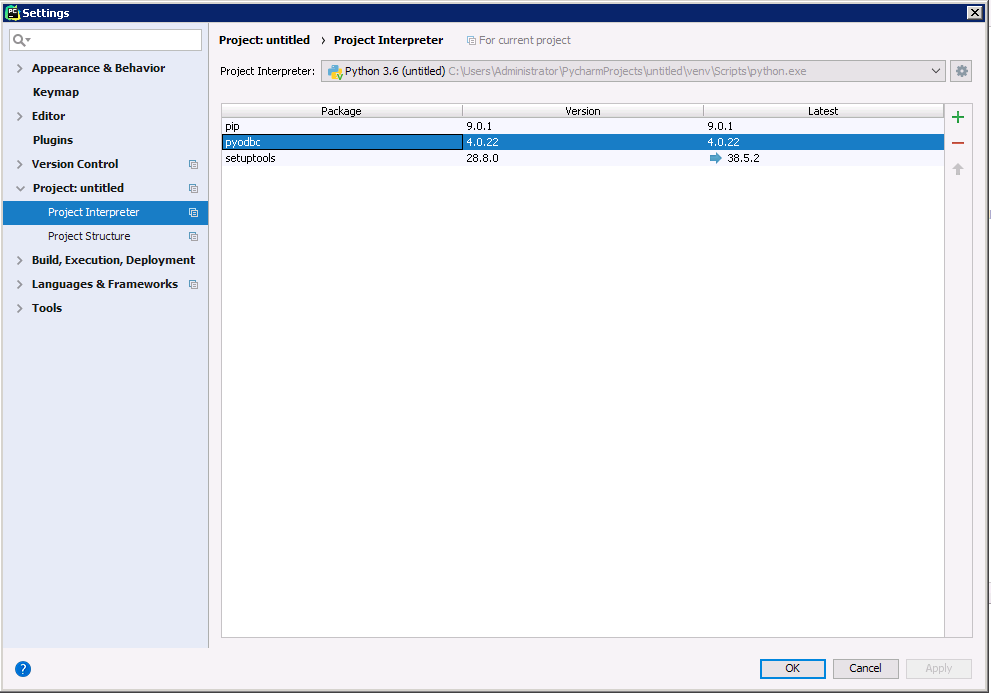Discover how a bimodal integration strategy can address the major data management challenges facing your organization today.
Get the Report →Using the CData ODBC Driver for JSON in PyCharm
Connect to JSON as an ODBC data source in PyCharm using the CData ODBC Driver for JSON.
The CData ODBC Drivers can be used in any environment that supports loading an ODBC Driver. In this tutorial we will explore using the CData ODBC Driver for JSON from within PyCharm. Included are steps for adding the CData ODBC Driver as a data source, as well as basic PyCharm code to query the data source and display results.
To begin, this tutorial will assume that you have already installed the CData ODBC Driver for JSON as well as PyCharm.
Add Pyodbc to the Project
Follow the steps below to add the pyodbc module to your project.
- Click File -> Settings to open the project settings window.
- Click Project Interpreter from the Project: YourProjectName menu.
- To add pyodbc, click the + button and enter pyodbc.
- Click Install Package to install pyodbc.

Connect to JSON
You can now connect with an ODBC connection string or a DSN. See the Getting Started section in the CData driver documentation for a guide to creating a DSN on your OS.
See the Getting Started chapter in the data provider documentation to authenticate to your data source: The data provider models JSON APIs as bidirectional database tables and JSON files as read-only views (local files, files stored on popular cloud services, and FTP servers). The major authentication schemes are supported, including HTTP Basic, Digest, NTLM, OAuth, and FTP. See the Getting Started chapter in the data provider documentation for authentication guides.
After setting the URI and providing any authentication values, set DataModel to more closely match the data representation to the structure of your data.
The DataModel property is the controlling property over how your data is represented into tables and toggles the following basic configurations.
- Document (default): Model a top-level, document view of your JSON data. The data provider returns nested elements as aggregates of data.
- FlattenedDocuments: Implicitly join nested documents and their parents into a single table.
- Relational: Return individual, related tables from hierarchical data. The tables contain a primary key and a foreign key that links to the parent document.
See the Modeling JSON Data chapter for more information on configuring the relational representation. You will also find the sample data used in the following examples. The data includes entries for people, the cars they own, and various maintenance services performed on those cars.
Below is the syntax for a DSN:
[CData JSON Source]
Driver = CData ODBC Driver for JSON
Description = My Description
URI = C:/people.json
DataModel = Relational
Execute SQL to JSON
Instantiate a Cursor and use the execute method of the Cursor class to execute any SQL statement.
import pyodbc
cnxn = pyodbc.connect('DRIVER={CData ODBC Driver for JSON};URI = C:/people.json;DataModel = Relational;')
cursor = cnxn.cursor()
cursor.execute("SELECT [ personal.name.first ], [ personal.name.last ] FROM people WHERE [ personal.name.last ] = 'Roberts'")
rows = cursor.fetchall()
for row in rows:
print(row.[ personal.name.first ], row.[ personal.name.last ])
After connecting to JSON in PyCharm using the CData ODBC Driver, you will be able to build Python apps with access to JSON services as if it were a standard database. If you have any questions, comments, or feedback regarding this tutorial, please contact us at [email protected].





